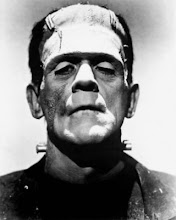Mark Wahlgren Summers, a University of Kentucky history Professor, wrote a book about the politics of the 1800s called Party Games.
Critic Ralph Derickson summarizes that in Summer's book...
"Summers also points out that hardball politics and third-party challenges helped make the parties more responsive. Ballyhoo did not replace government action. In order to maintain power, major parties not only rigged the system but also gave dissidents part of what they wanted, Summers added.The persistence of a two-party system, Summers concludes, resulted from its adaptability, as well as its ruthlessness. Even the reform of political abuses was shaped to fit the needs of the real owners of the political system – the politicians themselves."
http://www.uky.edu/PR/News/Archives/2004/May2004/040507_summers_book.htm
When Derickson mentions the political parties rigging the system I immediately thought of Dr. Frankenstein and how he too "rigged the system"... the system being procreation or even science.
Even though Dr. Frankenstein was told that his efforts were going to end up being a "waste of time", he didn't let that stop him. As the two-party system Derickson mentions above was ruthless.. I feel that Dr. Frankenstein's selfish lifestyle (ignoring his family and friends, ignoring possible consequences) was also. His ruthlessness allowed him to stick by and complete the creation as the two-party system's ruthlessness allowed them to remain persistent.
Adrianna Sikula

No comments:
Post a Comment